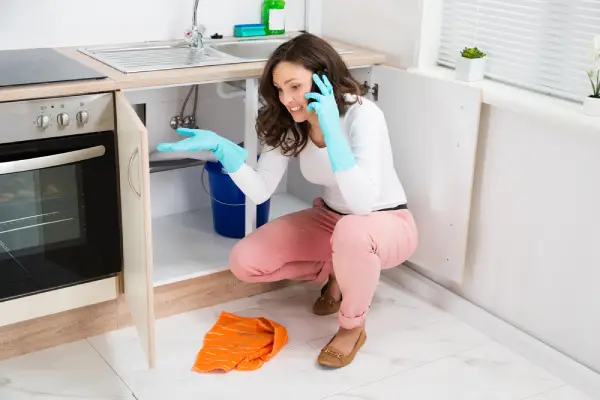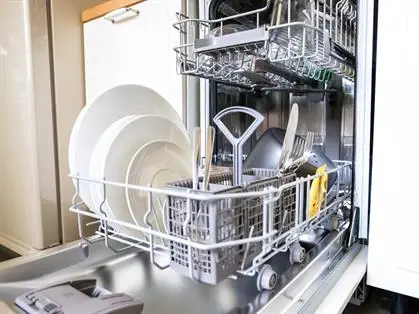
Kitchens serve as the center of many activities for families and are no place for irritating plumbing leaks that waste enough water. The two most common sources of leaks in the kitchen are your sink and your dishwasher. In this article, I’ll show you how to address the common causes of leaks in these areas and let you know when it’s time to call in a local pro.
Stop Dampness under the Cabinets
Dampness under the kitchen cabinets is often due to corroded drain pipes, especially in older homes. This is a sign of possible leaking. Look for rusted areas in the pipes where water can easily escape. Once you find a leak, you can easily replace a section of pipe yourself. Turn off the water supply to your sink and place a bucket underneath the section of pipe you plan to remove. Use channel locks or a monkey wrench to loosen the connections on both ends of the faulty section of the pipe. Take the pipe to a local home improvement store to find a replacement piece, preferably one made of ABS plastic. Replace the old section of the pipe with the new one to eliminate your leak.
Another possible source of puddles under the sink is a corroded garbage disposal. Over time, hard water and acidic foods or beverages can eat through the outer casing or the connections on your garbage disposal, causing leaks. If you can’t find a problem with the plumbing pipes under your sink, take a look at your disposal. Feel around the outside of the unit for any moisture after running the faucet for a few moments. If the problem is indeed at your disposal, call in a plumber. You can prevent trouble by maintaining your disposal. Avoid putting acidic foods, animal bones, corn cobs, and other hard or sharp items down the drain.
Dealing with Dishwasher Leaks
 Dishwasher leaks can damage your cabinetry and your floor. A leaking dishwasher may be caused by a number of problems, ranging from misuse to mechanical issues. If your dishwasher leaks only periodically, you could be occasionally overloading it or using excessive amounts of detergent, both of which cause overflow. More consistent leaks may be caused by a faulty door gasket, which allows water to escape during the dishwashing cycle. Check all the way around the seal to look for areas of wear or visible gaps. You can replace a faulty dishwasher door gasket yourself, or call an appliance repair company if you don’t feel up to the task. They can also check to see if the appliance is under warranty. Finally, a dishwasher leak may be due to loose or damaged pipes at the back of the appliance.
Dishwasher leaks can damage your cabinetry and your floor. A leaking dishwasher may be caused by a number of problems, ranging from misuse to mechanical issues. If your dishwasher leaks only periodically, you could be occasionally overloading it or using excessive amounts of detergent, both of which cause overflow. More consistent leaks may be caused by a faulty door gasket, which allows water to escape during the dishwashing cycle. Check all the way around the seal to look for areas of wear or visible gaps. You can replace a faulty dishwasher door gasket yourself, or call an appliance repair company if you don’t feel up to the task. They can also check to see if the appliance is under warranty. Finally, a dishwasher leak may be due to loose or damaged pipes at the back of the appliance.
Addressing plumbing leaks will save you money. Check out our site next month for more tips on addressing annoying leaks and other common plumbing problems, or call us for routine plumbing maintenance to prevent leaks, to begin with.
Have you ever experienced a kitchen leak?
- I can’t use my dishwasher because it leaks
- The cabinets under my kitchen sink are constantly damp
- I’ve been lucky, no leaks yet!
About the Author: Steve Ferree, Mr. Rooter Plumbing of Portland
Steve has been a trusted Mr. Rooter owner of Mr. Rooter Plumbing of Portland since 1999. With over 20 years to back him, Steve has experience with a wide range of plumbing-related solutions and systems. He and his team specialize in drain cleaning, sewer repair, re-piping, and more.

